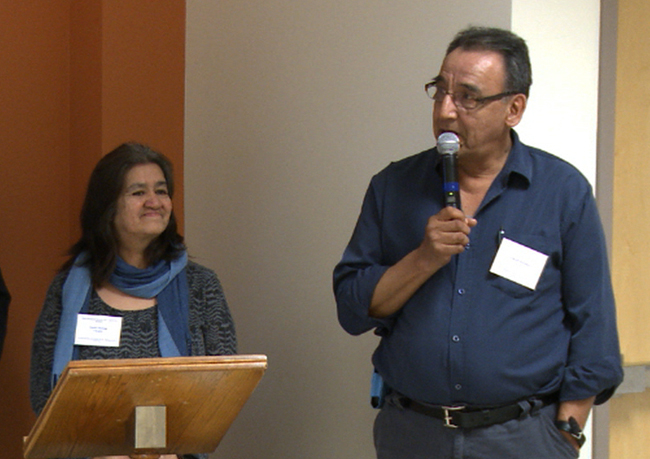Survivors adamant: It’s our turn to speak

By Karl Hele
MONTREAL –Presentations by “settler” academics at times met heated responses from residential school survivors during a mini-conference on the Legacy of Residential Schools in Quebec.
When Ronald Niezen of McGill University presented a paper in which Oblate Brothers who operated most of the Catholic residential schools expressed indignation that Native students were “ungrateful…for what was being done for them”, Cree survivor Elma Moses demanded he explain.
“Why bring these men’s voices to us? We know what they have to say…and they have had their opportunity. Now it is our turn to speak.
Moses was one of five survivors to speak during the April 18-19 event, organized by Karl S. Hele, Anishinaabe, Concordia University, and Marie-Pierre Bousquet, Settler, University of Montreal. The event took place a week prior to the Truth and Reconciliation Commission’s (TRC) event in Montreal
Participants also heard 11 presentations by academics and viewed fourdocumentaries, three of them produced by Indigenous people. The overall mood was sombre, but there was an open exchange of knowledge and experience and the main conclusion was the absolute need to include survivors’ voices in discussions on this topic.
Brian Gettler, a graduate of McGill University and TRC employee, claimed it was “very difficult to write an impartial history.” This sparked comments about the implausibility of “impartial histories” and questions about how his knowledge would be available beyond “esoteric articles”.
Normand Kistabish and Emilie Mowatt, both from Pikogan (Abitibiwinni), as well as Solomon Wawatie, from Rapid Lake (Kitiganik), spoke eloquently about their experiences before, during, and after attending residential schools.
The trauma became evident when Emile lost her voice after watching one of the documentaries. Her inability to speak spoke volumes. The following day she found her voice and asked: “What right do they have to do this?”, revealing that she only “woke’ from her experiences when her last daughter was 27 years old.” Emilie concluded: “There is a healing process and there is hope.”
Solomon Wawatie added:“I speak as though I am angry, but I am at peace.”
TRC Commissioner Marie Wilson closed the conference with the hope that the knowledge-sharing would “inspire reconciliation” and that “the government of Canada hasn’t told the people of Canada what they’ve been signed up for.”
The mini-conference will be rebroadcast on the web for 30 days beginning 1 June 2013 for free in English and French at vpsolution.tv/legacies. Disk copies of the conference in French and English will also be available by Fall 2013 (contact Karl S. Hele at karl.hele@concordia.ca for copies).

